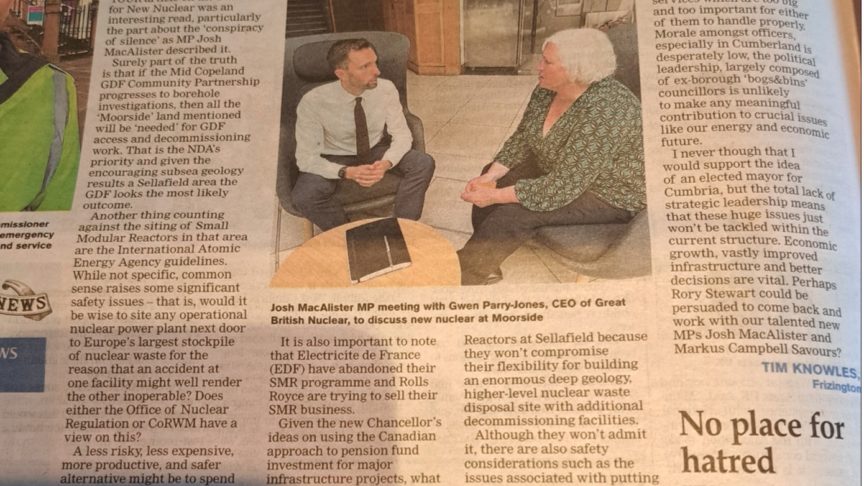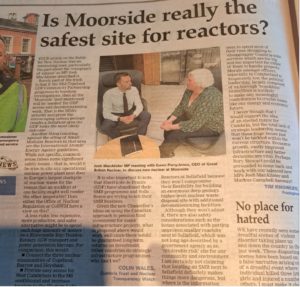“A letter signed by more than 100 political, business and union leaders is calling for urgent action to resolve land issues at Moorside so that new nuclear power stations can be built.
Whitehaven and Workington MP Josh MacAlister wrote the letter, which has been signed by fellow Cumbrian MPs Julie Minns and Markus Campbell-Savours, local members of the House of Lords, Cumberland Council leader Mark Fryer, trade union leaders in the nuclear industry and dozens of local business leaders.”
Here is the News & Star journal introduced the letter below (source):
“In my first few weeks as an MP I’ve met with ministers, the NDA, Great British Nuclear and leading nuclear industry figures. It’s become clear that there’s been a conspiracy of silence for years over plans for new nuclear in our area. The last government told our community to wait in line and trust the process. But having looked in detail at the process, we’ve been set up to fail because of competing claims on land at Moorside.
The NDA want to use a large chunk of the land at Moorside for potential future decommissioning activity. If all of the land they want is taken out then there’s not enough land left to build the number of small modular reactors Great British Nuclear wants.
Today, over 100 local leaders are ringing the alarm on this. Our ask is simple – this is land designated for new nuclear use and it should be prioritised for new nuclear use. The NDA should develop contingency plans for their future land needs and buy alternative land for future decommissioning activity if and when the need arises.
West Cumbria has the land ready to go, the strong community consent, the skills and the nuclear infrastructure which make our area the perfect location for new nuclear. We do not want to miss out on another opportunity.”
In reaction to this letter, Colin Wales, Chair of Cumbria Trust and member of Nuclear Transparency Watch, wrote the published letter below:
“Your article on the Battle for New Nuclear was an interesting read, particularly the part about the “conspiracy of silence” as Mr. Mac Alister described it. Surely part of the truth is that if the Mid Copeland GDF Community Partnership progresses to borehole investigations, then all the “Moorside” land mentioned will be “needed” for GDF access and decommissioning work. That is the NDA’s priority and given the encouraging subsea geology results a Sellafield area the GDF looks the most likely outcome.
Another thing counting against the siting of Small Modular Reactors in that area are the International Atomic Energy Agency guidelines. While not specific, common sense raises some significant safety issues i.e., Would it be wise to site any operational nuclear power plant next door to what Europe’s largest stockpile of nuclear waste for the reason that an accident at one facility might well render the other inoperable. Do either the Office of Nuclear Regulation or CoRWM have a view on this?
A less risky, less expensive, more productive, and safer alternative might be to spend such huge amounts of money on a Morecambe Bay/Duddon Estuary 3GW transport and power generation barrage. For comparison, this would :-
*Connect the 3 nuclear communities of Copeland, Barrow and Heysham.
*Provide easy access for West Cumbrians to the M6 southbound and increase tourism to the Western Lake District.
*Provide a flood defense for local communities against predicted rising sea levels.
*Provide 2 x the power output than 3 SMR’s
*As part of a deal to host the GDF it could provide us with cheaper power, an attraction to business investors and provide west Cumbrian households with discounted electricity bills for decades to come.
*Be built using a local workforce.
* Have a lifetime of 120 years as opposed to 60 years for nuclear power plants.
It is also important to note that Electricite de France (EDF) have abandoned their SMR programme and Rolls Royce are trying to sell their SMR business.
Given the new Chancellor’s ideas on using the Canadian approach to Pension Fund investment for major infrastructure projects, what is proposed above would work well since there would be guaranteed long term returns on investment. Other countries do strategic infrastructure programs, why can’t we?
Colin Wales – Cumbria Trust and Nuclear Transparency Watch”


You must be logged in to post a comment.